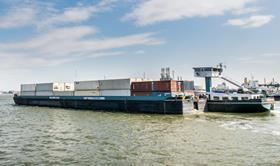
The difficulty of attracting young people to work in inland shipping has been one of the key challenges for the sector, but it has also helped to drive innovation in exciting advancements such as unmanned shipping.
According to Belgium’s Port of Antwerp, automated navigation is the future of inland shipping, thanks to the use of 3D sonar sensors, inspired by how bats sense their surroundings.
“In 2019, over 42 per cent of all goods entered or left the port of Antwerp via inland waterways,” said port alderman Annick De Ridder. “In other words, inland shipping is crucial if we want to ensure the accessibility of our city and our port. By focusing on technology such as unmanned navigation, we want to further increase both the market share and the competitiveness of inland shipping.”
“Unfortunately, inland shipping is not exactly a sexy sector,” said Svetlana Samsonova, liaison officer on multiple joint research projects carried out by the University of Antwerp and the Port of Antwerp. “Attracting young talent to this sector is not an easy feat. That's why we focus so strongly on innovation. Unmanned vessels can lead to substantial cost savings, as well as provide an answer to our increasing traffic congestion problems and the rising costs of road transport. Smart vessels definitely have a part to play in the multimodal transport approach that the Port of Antwerp wants to help develop further.”
Researchers at CoSys-Lab, a research group in UAntwerp's Faculty of Applied Engineering, have developed a 3D sonar sensor for the port, completed with 32 waterproof microphones.
“In order to achieve fully autonomous navigation, constant monitoring of the ship's surroundings is absolutely crucial,” explained Professor Jan Steckel of CoSys-Lab. “Cameras can be used, of course, but when visibility is poor – due to dust, water sprays, mud, smoke or fog – they don't work properly.”
In the final weeks of 2020, the technology was tested successfully on the Tuimelaar, one of the Port of Antwerp's test vessels. A follow-up project is reportedly planned for 2021, with Steckel’s 3D Sonar and Lidar for Vessel Monitoring project getting the go-ahead as part of the Smart Docking Innovation Challenge.



